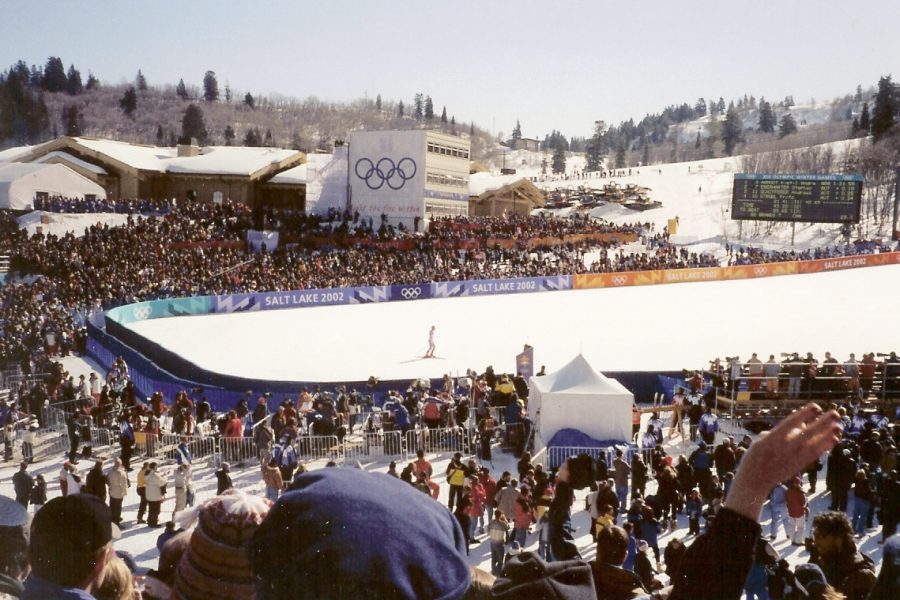Brown: SLC Deserves Another Olympic Bid
Men’s super-G at Snowbasin Resort during the 2002 Winter Olympics. (Photo by Ken Lund | Courtesy Wikimedia Commons)
August 20, 2021
Almost 20 years ago, Salt Lake City hosted its most important sports event: the 2002 Winter Olympic Games. During the games, I was not even a year old, but I’ve heard stories from my family that make Salt Lake sound like a completely new place. My grandma always quips, “When was the last time you saw a beer garden on Main Street?”
The Olympics also left many physical landmarks such as the Utah Olympic Park, Olympic Oval and the cauldron at Rice-Eccles Stadium. Now, Salt Lake City has been selected again by the U.S. Olympic Committee for a bid. If granted, Salt Lake City would host the games in either 2030 or 2034.
Due to the success of 2002, the pre-existing infrastructure and the benefit the games give to Olympic popularity, the International Olympic Committee should choose Salt Lake City as a site for future games.
The 2002 Winter Olympics are looked back on in a positive light, but it had its fair share of setbacks. Stories of unethical conduct including bribes and payoffs cast a shadow on Salt Lake’s efforts to host the 2002 Olympic games. In the wake of this near-disaster, multiple Salt Lake Organizing Committee (SLOC) and International Olympic Committee (IOC) staff were forced to resign from their positions. However, Sen. Mitt Romney took over and the old antics were out the door.
Before, the SLOC was facing nearly $400 million in budget deficits. After Sen. Romney entered the budget was reformed through enhanced sponsorship attainment and conservative spending. The 2002 Olympics ended with a profit topping $100 million. Despite worries surrounding the terrorist attacks of 9/11 and further attacks on the games, Salt Lake is widely viewed as one of the most successful Winter Olympics of all time. Overcoming unexpected obstacles and holding stable finances, Salt Lake impressed the world. The success of 2002 cannot and should not be overlooked when considering future host cities.
Olympic game infrastructure is expensive. With 15 sports showcased in the winter games, it is critical for the host city to have the facilities to support such events over the two-week period. Costs of infrastructure often reach tens of billions of dollars for Olympic hosts, and often dampen a host’s ability to turn a profit. In Salt Lake, that’s not a problem.
The infrastructure built in 2002 was built to last around 20 years, so it would need some renovations. But, these renovations would likely cost around $40 million, a price tag far lower than that of its potential competitors.
The price would be worth it for the locals too. Each year, thousands of Utahns make use of the Olympic facilities. A modern renovation would only increase their consumer base.
With the self-proclaimed “greatest snow on earth” and the facilities to support it, a Salt Lake Winter Olympics in 2030 or 2034 would be much easier to organize. Some may argue that Vancouver should receive the bid for this very reason. Having hosted the Winter Games in 2010, Vancouver’s facilities would cost even less to renovate. However, Salt Lake had much more success from a financial standpoint in 2002, meaning it could likely absorb the cost better.
Throughout the Tokyo 2020 Olympics, I found myself watching far fewer events. Not because I was uninterested in the athletes or turned off by the politics, but because the broadcasts were so late. This sentiment was the same for many Americans. In the last U.S.-hosted Summer Olympics, nearly 40 million Americans watched the opening ceremonies. Tokyo 2020 didn’t even reach half of that.
Part of the reasoning can be chalked up to the declining interest in the Olympics over recent years, but the time difference cannot be ignored. By putting the Olympics in Salt Lake City, a very profitable U.S. market is able to watch any event at a reasonable time. Obviously, not every Olympic game needs to be held in the States, but holding a few in the next two decades could go a long way to increase interest in the games and lend viewers to future foreign games.
Granting Salt Lake City another Olympic game should be a no-brainer for the IOC. Its previous success in hosting the games indicates that not only would they have a great chance to get out of the games debt-free, but would also sustain great economic benefit.
The reason for this is based in part on the existing infrastructure in Salt Lake. Not to mention, U.S.-based games generally do well, and more games in America might help boost the falling viewership numbers.
The memories created in a city through hosting the Olympics are unparalleled. With a potential Winter Olympics in Salt Lake in 2030 or 2034, a new generation of Utahns should have a chance to create more.








